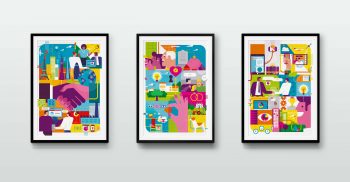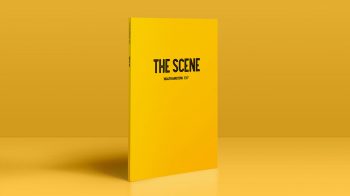How you can build your own stunning website today!
What is a website builder?
Website builders are all-in-one tools that allow you to build a site quickly, without needing to know any Photoshop, coding or site design skills – if you can post photos or video to Facebook then you can create a site using a website builder tool basically.
What you get is a range of pre-designed, pre-coded templates from which you can create your own site. In actual fact what they actually are is a whole bunch of software that lives on a web server at a hosting company – which you or I see as designed themes – which we choose, customise and publish.
All will offer domain name registration or you can bring your own to the party and all will offer various hosting and support packages to get you and keep you up and running.With thousands of templates, e-commerce and many other exclusive features we’ve done all the hard work so you can create your own website with no experience, in minutes!
But is it right – well that’s what we are here to find out
It’s never been easier to set up a professional-looking website without any Photoshop or coding experience. Well-known site builders like Squarespace, Weebly, and Wix are constantly improving and newer entrants like Simvoly, Strikingly and uKit, are popping up all the time with their own clever new twists on the process. All with their clean templates, simple drag and drop interfaces and ever expanding add-ons that fit just about any sector or industry it sounds like a no brainer right? But is it all really too good to be true?
If you are a new business with few resources, are a larger company who just want a discreet campaign site for a limited period, if you want to up-skill your comms team or just have absolute control over your site and its content then using an affordable website builder may well be a viable option for you. However, if you are an SME with growth and a development plan crying out for a next-stage, social friendly, value-adding, technically stable web presence, using a ‘free’ website builder could cost you thousands in wasted hours and much more in the potential of opportunity-cost lost revenues.
The truth is, there is no right or wrong answer, it’s really all about the type of website you are considering, your resources and ultimately what’s best for you and your organisation.
In this article, we will address the key aspects and issues around whether to use an outside agency to help with your website design and build or whether you should be considering developing you own knowledge, saving yourself money and doing it yourself.
Website Builders – the Pros & Cons
If you’ve done some research, you’ve likely heard of some of the popular website builders already. There’s Wix, uKit, Simvoly, Squarespace, Weebly, SiteBuilder, Strikingly and GoDaddy to name but a few. Options like these offer a great tool set to get you online, and quickly. But just before you lift that mouse in anger and plunge right in, lets take a walk with through the pros and cons of the world of the web builder
The pros
The cost
The main benefit is obviously the price. On the face of it they are extremely cost effective. Some themes are free, while the better builders are still very affordable to use, costing anywhere between £50 and £250 to get what you need. But clearly, going down this route means on the face of it, you’ll spend less money to use a builder for your website, than any freelancer or agency.
The speed
With no bespoke design process and almost all of the development work already done, if you’re looking for a quick way to get online, then website builders are here to save the day! You can have your new site up within a day (hours if you believe some of the sites) using a website builder. When hiring a design firm, typically it can easily take 4-6 weeks from start to launch for small to medium projects, much longer for more involved and technical sites.
And ease of use
By definition website builders have to be very easy to use – if they were in any way involved or required technical knowledge then the moment and the sell is lost straight away. So clearly one of the essential and most obvious advantages in using a website builder is that it requires no technical or design knowledge at all. These programs are purposely created for people who don’t know anything about coding or design, and by providing a simple drag and drop interface and access to an ever-growing bank of industry-specific resources we can all now create online shops, beautiful galleries, eye-catching parallax effects, newsletter email forms, and more with a few easy clicks.
Predictability
With a pick-your-own theme approach, at least in theory (see the quality of the content below), you can browse and will know what your website (or at least the framework) looks like right from the start, eradicating the risk that the design process ends up being a big let down and before you’ve spent any money at all.
And let not the agency (that us by the way) get snooty on you here. There is no doubt that there are a lot of very talented designers out there creating some very good looking themes so absolutely it could be a great way of creating your own great looking website without any design skills or any reliance on external designers telling you what you should look like.
Our old friend Google
If we can’t see you, it doesn’t really matter how good your site is does it. So while it is true to say that many website builders have had their issues when it comes to SEO, many have made great improvements over the years and now most come with search engine optimization tools and access to Google Analytics as standard.
Features
With the better builders you can expect to find a range of features that will meet even the most complex of technical requirements. There are contact forms, image sliders, newsletters, online stores, and blogging tools to name but a few. And because they are designed with many different users and industries in mind, you can expect easy configuration to fit your needs.
Being able to Export
While some website builders can’t export their site to other platforms, there are many website builders which can easily do this. Exporting pages and websites is essential for changing hosting or domains for instance and of course you don’t want have to start from scratch. While individual performance will vary, your research should be able to tell you pretty quickly the most flexible and custom-firendly themes and templates that should be easily exportable to other platforms.
The cons
Its not just about the design
Web builders focus on the elements of the service that can be productised and packaged. Ultimately this comes down to “which theme do you want to buy?” and “what support package?”. But design communication isn’t ever just about what something looks like but it is almost always about what its for, what it needs to say, who to and how it plans to do it. Considered elements of service that web builders will deliberately strip away, key marketing disciplines that professional communication companies will deliberately play up. Often the most tangible benefits of working with a development agency are also the least tangible to grasp: the digital strategy, the nuance of message and the subtlety of professionally generated content and the clarity and brevity of bespoke coding.
And even then its all a bit beige …
One of the most immediate advantages of a custom website is the design itself. While the quality of templates available from DIY solutions has vastly improved, do your research well and after a while everything does begin to appear just a little bit beige. If you think about it, the brief for designing and effective theme and the brief for designing an effect web presence bespoke to you are completely, diametrically opposed to each other. Themes work on large common denominators, we are not denominators, and we are all, in our own small way, capable of telling our own unique story. But unless your content is thoughtfully and personally crafted there is always the danger that a mass produced theme will lead to a mass produced feel to your website.
The quality of the design
To be honest, we’ve seen some really bad websites created using builders. To be fair when we’ve not had a hand in content generation and population we’ve seen some pretty bad bespoke sites too. Choosing a theme designed by a professional designer and populated specifically with nicely cropped stock shots and neatly fitting headings is any web builders way of showing you what something could look like. It is absolutely not guarantee of what it will look like. Why? Because contrary to popular myth, and (sorry about this folks) not everyone is a designer, not everyone knows what looks good. So if you have taken the time and selected the right agency, at the very least you should be able to trust their visual judgement.
Check out your assets
And even with absolutely the best theme out there, the one completely tailored to your needs, taste and budget, without quality visual and editorial content it simply will not look like the showroom sample you signed up to. And that’s simply because the designer that created the theme had access to a vast array of high quality image assets from the web builder, to create the most finely crafted, best-case-scenario demo possible. So always remember, and this goes for bespoke sites just as much, if you’ve fallen for that image-driven design with the carefully constructed and managed editorial it all has to come from somewhere and unless your content matches the content used in the demo there’s always a chance you may end up disappointed.
The cost
Using the free option that many web builders offer, you may find the end result to not be what you expect. Consider your domain, the hosting fees, and the specific features your website really needs, not just now but moving forward. Remember, your buying a product and an ongoing service from a business and while the extra fees aren’t generally that onerous, it’s important to think about the investment you’re making, and the long-term return. Not just with your money, but also with your time.
Google will see you now
Website builders certainly meet the basics of SEO but despite making significant strides in this area it is still fair to say that off-the-shelf websites simply do not perform as well as custom built websites. Search engines, like bees to honey, are attracted to high quality, clean, uncluttered code and original and specific content. Themes by definition cater for the all not the few, you don’t for instance have control of the code, just the design and when code is less structured, and the construct or performance of your content has not been thought through, very often your SEO is left wanting.
Speed of thought and deed
Off-the-shelf web solutions may well contain superfluous or redundant code, for instance, if the template gives you three navigation options, clearly you can only use one but a users browser will not discriminate what it does or does not load so you will in effect, end up with some redundant code just sitting around watching the world go by. And this does matter. The most obvious repercussion is page load speed, because the browser is having to read more code, it will inevitably take more time to do it. The other key effect is visibility. As we have noted above, search engines like their codebase to be as swiss, thats as clean as possible, and websites with lots of redundant code will be effectively penalised in search engine rankings for their coding tardiness.
When a web builder is right for you
The in-house marketing team
We have several clients who take the twin track approach. They use a professional company for the corporate, investor and recruitment sites but for discreet campaigns, thought leadership programmes, one-off event promotions etc the in-house marketing team create their own sites but using as the retained agency to create the to varying degrees the visual/graphic assets and/or editorial. This arrangement has many benefits, the client isn’t looking at large figures for every micro-site they may need, the comms team have flexibility in what they can do (while up-skilling in the process) while the main sites integrity is maintained and we’re there to monitor the quality of the assets (and the overall result) and keep the whole thing on message.
The business with the right assets
Many start ups and small businesses don’t posses the visual assets of sufficient quality or number to replicate the demo themes they buy but If you are say a freelance photographer, artist, illustrator, or perhaps a small company in a creative industry then many of the themes offered on these sites could work well for you. With the right assets they are almost sold as seen as you will have your own visual assets to replicate the theme you most like.
If the site is not business critical
Say you run a small plumbing firm, garage or maybe the local chippy – it’s probably fair to say your website won’t be key to the success of your business, its also fair to assume you don’t want to spend too much money on it either. What you need is something neat and tidy, somewhere we can find where you live, when you are open and a phone number. At a time when your website is not business critical to your business then yes a theme can often be the best solution.
The happy amateur
The happy amateur is the another group with a good fit to the theme approach. We have a friend who is renovating a 1980s German fire engine and these sorts of sites are perfect to tell the world about that type of venture, or your passion for gardening or bottle top collecting. They absolutely can become your happy place for the stuff thats important to you, without having to worry about finessing content and presentation for a paying audience.
If you do take the plunge and decide to do it yourself here are four simple tips to get you started:
1 Developer support availability
The majority of theme marketplaces will have information on the developer, logs of all the updates that have been released for each particular theme and customer reviews and ratings. You can get a lot from this information.
2. Mobile readiness
Almost all popular modern-era website themes are responsive, but that doesn’t necessarily mean that they are guaranteed to provide an excellent mobile experience. There are plenty of websites that will pass Google’s mobile test, yet provide such a poor user experience that they are worthless on smaller screens, in terms of conversion potential.
The majority of website themes will have working demos for you to play with before purchasing, so make sure to put them through the ringer on mobile and tablet devices.
3. Available plugins, apps and extensions
It’s very rare that you will run a website theme in its stock version — you will customize the look and feel to match your brand, as well as add special features to enhance the user experience and turn more traffic into leads, sales and revenue
There are plenty of plugins that can help you implement and manage download offers with no coding or development skills needed. Most of the popular services you will use with your website, like Mailchimp, for example, has plugins available that make integration simple. Make a list of what you will be using and what features you will need to add to your theme and reverse engineer the best options.
4. Cross-browser compatibility
Testing your website theme on all the popular web browsers is an important step, especially if you are considering using one that hasn’t been updated recently. With so many different devices, browsers and operating systems being used, testing helps ensure that your theme will provide the same user experience and functionality for everyone.
There are plenty of free tools and resources available online, as well as paid options that offer a free trial and if you do spot an issue on a particular browser you are then better placed to investigate it further.
Conclusion
Although they can sound basic, a good website builder can deliver a professional looking site that uses mobile-friendly best practices, integrates with social media and e-commerce tools, and seamlessly updates to stay current and secure. And the truth is, hiring a professional web designer or digital agency is not for everyone. If you don’t need your site to make you money or indeed, you don’t have much money, if you are a small businesses setting up an unproven concept or the newby self-employed wanting to promote yourself and test the waters then a website builder can offer a low-stress, low-cost option for creating a good-quality site.
And realistically, if you want your new website to launch within a week or two then it’s often your only realistic option.
But If its important that your customers can find you and when they do, you make a good and the right impression. If you trade online and want to be able to tell your story and reflect your USPs in the best possible way, and if you want to show the world just how digital and social savvy you are; then your website is probably the most crucial part of your brand and almost certainly the professional digital agency is the route for you.















